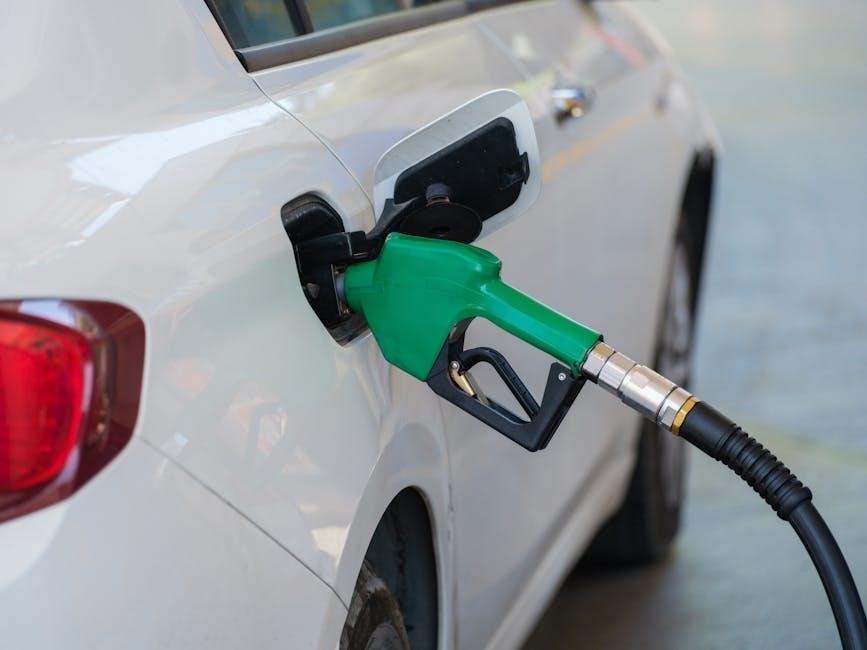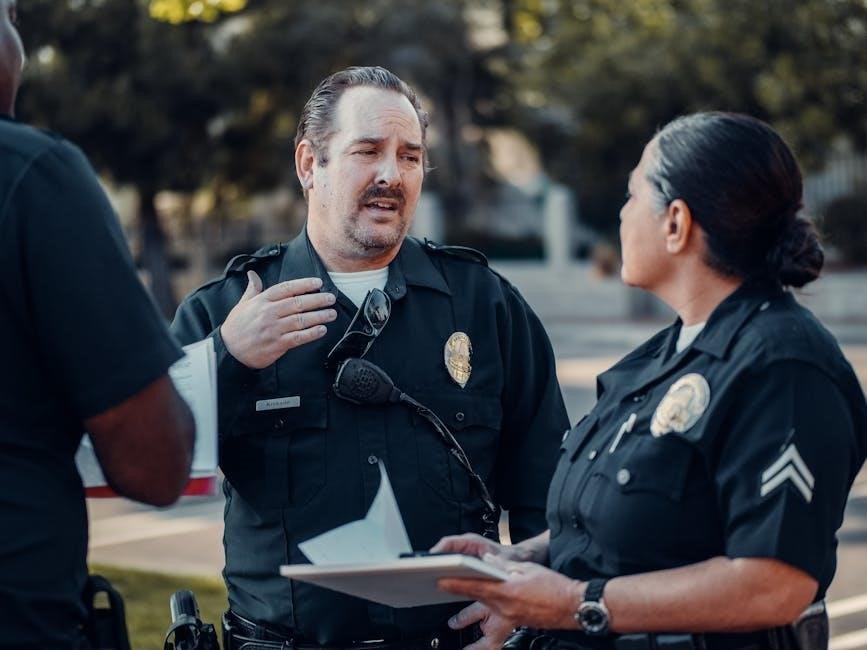diesel 911 instructions
Diesel 911 is a vital emergency solution for diesel engines, designed to address fuel gelling and frozen filters in cold weather, ensuring reliable engine operation during winter conditions․
Overview of Diesel 911 and Its Importance
Diesel 911 is a specialized additive designed to address fuel system issues in cold weather, particularly fuel gelling and frozen filters; It is an emergency solution for diesel engines, restoring fuel flow and ensuring engine operation in harsh winter conditions․ This product is crucial for maintaining vehicle performance and preventing breakdowns caused by cold-weather fuel problems․ Its effectiveness in quickly liquefying gelled fuel and thawing frozen filters makes it an essential tool for drivers in freezing environments, safeguarding against costly repairs and ensuring reliable engine function year-round․
Why Diesel Engines Need Special Care in Cold Weather
Diesel engines require special attention in cold weather due to the tendency of diesel fuel to gel or freeze․ In low temperatures, paraffin wax in diesel fuel solidifies, causing fuel to thicken and clog fuel lines and filters․ This can prevent proper fuel flow, leading to engine stalling or failure to start․ Cold weather exacerbates these issues, especially in regions with harsh winters․ Without proper measures, such as using additives like Diesel 911, drivers risk engine damage, costly repairs, and being stranded․ Regular maintenance and winter-specific precautions are essential to ensure reliable operation and avoid potential breakdowns․
What is Diesel 911?
Diesel 911 is a specialized emergency additive designed to resolve cold-weather fuel issues in diesel engines, such as gelled fuel or frozen filters, ensuring quick recovery and engine operation․
Definition and Purpose of Diesel 911
Diesel 911 is a specialized emergency additive designed to address cold-weather fuel issues in diesel engines, such as gelled fuel or frozen filters․ Its primary purpose is to restore fuel flow and engine operation quickly in emergency situations․ The product works by liquefying gelled fuel and thawing frozen fuel filters, ensuring the engine can run smoothly in extreme cold conditions․ It is not a preventative measure but rather a rescue solution for when fuel system problems arise due to winter weather․ Diesel 911 is added directly to the fuel tank or filters, with specific dosage instructions provided by the manufacturer․ It is safe for use in all diesel engines and complies with federal low sulfur content requirements, making it a reliable choice for emergency situations․ Proper usage involves following the recommended mixing ratios to avoid damaging the fuel system․ This product is particularly essential for drivers operating in freezing temperatures where fuel gelling is a common issue․ By resolving these problems swiftly, Diesel 911 helps prevent costly repairs and downtime, ensuring drivers can get back on the road without delay․ Regular maintenance practices, such as using preventative additives, can help reduce the need for emergency interventions like Diesel 911․ However, for immediate issues caused by cold weather, Diesel 911 remains the go-to solution for many diesel engine owners․ Always refer to the manufacturer’s instructions for correct application and dosage to ensure effectiveness and safety․ This product is widely recognized for its ability to handle emergency fuel-related problems effectively, making it a must-have for diesel drivers during winter months․ Its formulation is designed to target the root causes of fuel gelling and frozen filters, providing a quick and reliable fix․ While it is not a substitute for routine maintenance, Diesel 911 is an indispensable tool for emergency situations, offering peace of mind to drivers in extreme cold conditions․ Its effectiveness has been proven over decades, solidifying its reputation as a trusted emergency additive for diesel engines․ By understanding how and when to use Diesel 911, drivers can better prepare for winter driving challenges and maintain their vehicle’s performance․ Proper storage and handling of the product are also important to ensure its effectiveness when needed․ In summary, Diesel 911 is a critical emergency additive that helps diesel engines overcome cold-weather fuel issues, ensuring reliability and minimizing downtime during harsh winter conditions․
Key Ingredients and How They Work
Diesel 911 contains specialized ingredients designed to address cold-weather fuel issues․ Its formula includes fuel modifiers that prevent waxing and lower the pour point of diesel fuel, ensuring it remains liquid in freezing temperatures․ Additionally, it contains de-icing agents that thaw frozen fuel filters, restoring flow to the engine․ The product works by breaking down gelled fuel and dissolving ice crystals in filters, allowing the fuel system to function properly․ These ingredients are specifically engineered to target the root causes of winter-related diesel engine problems, providing a quick and effective solution to get engines running again․ The additive is safe for use in all diesel engines and does not contain alcohol, making it a reliable choice for emergency situations without risking long-term damage to fuel system components․ By targeting both fuel and filter issues, Diesel 911 offers a comprehensive solution to winter fuel challenges, ensuring drivers can rely on their vehicles in extreme cold conditions․

Instructions for Using Diesel 911
Diesel 911 is designed for emergency use to resolve cold-weather fuel issues․ Always follow the manufacturer’s guidelines for proper dosage and application to ensure effectiveness and safety․
Proper Dosage and Mixing Guidelines
For optimal results, add 3․2 ounces of Diesel 911 per 10 gallons of fuel to prevent icing․ If fuel is gelled, use 8 ounces per 10 gallons․ For biodiesel blends (up to 20%), double the dosage․ When addressing frozen filters, mix 50% Diesel 911 with 50% diesel fuel in the filter bowl․ Always follow the manufacturer’s instructions and take safety precautions․ Avoid adding Diesel 911 to the diesel exhaust fluid (DEF) tank․ Proper dosage ensures effective performance and prevents potential damage to your engine and fuel system․
Step-by-Step Application Process
Begin by ensuring your engine is cool and the vehicle is in a well-ventilated area․ Add the recommended dosage of Diesel 911 directly to the fuel tank․ For gelled fuel, pour the required amount into the tank and allow it to sit for 15-30 minutes․ If filters are frozen, remove them, fill the filter bowls with a 50/50 mix of Diesel 911 and diesel fuel, and reinstall․ Start the engine and allow it to run for a few minutes to circulate the treated fuel․ This process helps restore fuel flow and gets your engine running smoothly again․

Emergency Use of Diesel 911
Diesel 911 is designed for emergency situations like gelled fuel or frozen filters, helping restore engine operation quickly in cold weather conditions when immediate action is needed․
How to Handle Gelled Fuel or Frozen Filters
When encountering gelled fuel or frozen filters, Diesel 911 is a reliable solution․ Add 8 oz of Diesel 911 per 10 gallons of fuel to address gelled fuel, or 3․2 oz for prevention․ For frozen filters, remove and fill them with a 50/50 mix of Diesel 911 and diesel fuel, then reinstall․ This process helps restore fuel flow and ensures engine operation resumes quickly․ Always follow the manufacturer’s dosage instructions for optimal results and safe use in emergency winter situations․
When and How to Add Diesel 911 in Winter Conditions
Use Diesel 911 in cold weather when fuel gelling or filter icing occurs․ For prevention, add 3․2 oz per 10 gallons before driving in freezing conditions․ In emergencies, use 8 oz per 10 gallons to reliquefy gelled fuel․ If filters are frozen, treat them with a 50/50 mix of Diesel 911 and diesel fuel․ Always check weather forecasts and apply the product proactively to avoid engine shutdowns․ Ensure proper dosage to maintain fuel flow and engine performance during harsh winter conditions․

Safety Precautions
Do not add Diesel 911 to the diesel exhaust fluid (DEF) tank․ Use as directed; improper application can harm your engine․ Keep away from heat sources and sparks․
Important Warnings and Safety Measures
Always follow the manufacturer’s instructions for Diesel 911․ Avoid overuse, as it may damage engine components․ Never add Diesel 911 to the diesel exhaust fluid (DEF) tank․ Handle the product in well-ventilated areas, away from open flames or sparks․ Wear protective gloves and eyewear․ If skin or eye contact occurs, rinse thoroughly with water․ Keep out of reach of children․ Use only in diesel engines and nonroad equipment․ Ensure proper ventilation when treating gelled fuel or frozen filters․ Diesel 911 is for emergency use only; it is not a substitute for regular fuel maintenance․
What Not to Do When Using Diesel 911
Never add Diesel 911 to the diesel exhaust fluid (DEF) tank, as it can cause system damage․ Avoid overusing the product, as it may harm engine components․ Do not use Diesel 911 as a preventative measure; it is designed for emergencies only․ Never mix Diesel 911 with other additives without consulting the manufacturer․ Ignoring the recommended dosage can lead to ineffective treatment or engine issues․ Do not use Diesel 911 in non-diesel engines or vehicles․ Avoid adding it to already gelled fuel without proper safety precautions․ Never ignore proper handling and ventilation guidelines when using the product․
Troubleshooting Common Issues
Identify gelled fuel or frozen filters promptly․ Use Diesel 911 as directed to restore fuel flow․ Always follow proper diagnostic steps before treatment․
Diagnosing Fuel System Problems
Identify issues like gelled fuel or frozen filters by symptoms such as engine stalling or hard starting․ Use Diesel 911 for emergency situations, ensuring proper dosage․ Add 3․2 oz per 10 gallons to prevent icing or 8 oz to reliquefy gelled fuel․ For biodiesel blends, double the amount․ If filters are frozen, mix 50% Diesel 911 with diesel in the filter bowl․ Always act quickly to avoid further damage․ Carry an emergency kit with Diesel 911 and winter-blend diesel for cold weather preparedness․
How to Prevent Future Fuel-Related Issues
To avoid fuel system problems, regularly use a preventative diesel additive like PS White to winterize your fuel․ Check fuel filters frequently, especially in cold conditions, and replace them as needed․ Store diesel fuel in clean, dry tanks to prevent contamination․ Always use high-quality diesel fuel suitable for your climate․ Consider adding a winterizing additive before temperatures drop to prevent gelling․ Keep an emergency kit with Diesel 911 on hand for unexpected issues․ Regular maintenance and proper fuel care ensure long-term engine health and reliability․

Preventative Measures
Regularly using a preventative diesel additive like PS White or similar products helps winterize your fuel system․ Check and replace fuel filters seasonally, especially before cold weather․ Store diesel fuel in clean, dry tanks to avoid contamination․ Always use high-quality fuel suitable for your climate․ Consider adding a winterizing additive before temperatures drop to prevent gelling․ Keep your vehicle’s maintenance schedule up to date, including fuel system checks․ These proactive steps ensure your diesel engine runs smoothly and avoids costly repairs․
Using Diesel 911 as Part of Routine Maintenance
While Diesel 911 is primarily an emergency solution, it can also be incorporated into routine maintenance to prevent fuel-related issues․ Adding a small dose of Diesel 911 to your fuel tank during colder months helps prevent fuel gelling and keeps your engine running smoothly․ Follow the manufacturer’s recommended dosage to avoid over-treatment, which could harm your fuel system․ Regular use ensures your diesel engine remains protected against cold weather conditions and maintains optimal performance․ This proactive approach complements other maintenance practices, ensuring reliability and extending the life of your vehicle․
Combining with Other Additives for Optimal Performance
While Diesel 911 is effective on its own, combining it with other additives can enhance fuel system performance․ For routine maintenance, consider using a non-alcohol-based winter additive like PS White to prevent fuel gelling before it becomes an issue․ Diesel 911, however, is specifically designed for emergency situations and should not be relied on as a preventative measure․ Always follow the manufacturer’s guidelines when mixing additives to avoid over-treatment, which can harm your fuel system․ Balancing the right products ensures optimal performance and long-term engine health․

Diesel 911 vs․ Other Additives
Diesel 911 stands out as an emergency solution for gelled fuel and frozen filters, unlike other additives that focus on prevention, making it a top choice for critical winter situations․
Comparing Diesel 911 to Other Winter Additives
Diesel 911 is specifically designed as an emergency solution for gelled fuel and frozen filters, unlike many winter additives that focus on prevention․ While other products like Diesel Kleen or PS White may offer preventive benefits, Diesel 911 excels in rescuing engines already affected by extreme cold․ Its unique formula quickly thaws gelled fuel and unfreezes filters, making it indispensable for critical situations․ Other additives may improve fuel efficiency or reduce emissions but lack the rapid, targeted action of Diesel 911 in emergencies․ For immediate winter-related diesel issues, Diesel 911 remains the most reliable choice, with precise dosage instructions for varying severity levels․
Why Diesel 911 is Preferred for Emergency Situations
Diesel 911 is the go-to solution for emergency diesel engine issues due to its fast-acting formula that rapidly thaws gelled fuel and unfreezes filters․ Unlike preventive additives, it targets immediate problems, restoring engine operation quickly․ Its effectiveness in extreme cold and compatibility with all diesel engines make it a reliable choice for critical situations․ The precise dosage instructions ensure safe and efficient use, preventing further damage․ For emergency rescue, Diesel 911’s proven track record and instant results set it apart from other additives, making it essential for winter diesel operations․
Diesel 911 is a reliable emergency solution for diesel engines, proven to quickly resolve cold-weather issues․ Always follow instructions for optimal performance and long-term engine health․
Final Thoughts on Using Diesel 911
Diesel 911 is an indispensable tool for diesel engine owners, especially in cold climates․ It effectively addresses gelled fuel and frozen filters, restoring engine function quickly; While it’s designed for emergencies, incorporating it into your winter maintenance routine can prevent future issues․ Always adhere to the recommended dosage and application guidelines to ensure safety and effectiveness․ By using Diesel 911 responsibly, you can protect your engine from cold-weather damage and maintain reliable performance year-round․
Best Practices for Long-Term Diesel Engine Health
For long-term diesel engine health, regular maintenance is crucial․ Use Diesel 911 as part of your routine to prevent fuel-related issues․ Combine it with other additives for optimal performance․ Always follow the manufacturer’s dosage instructions to avoid over-treatment․ Monitor fuel quality and address gelling or freezing issues promptly․ Regularly inspect and replace fuel filters to ensure proper fuel flow․ By maintaining a consistent maintenance schedule, you can enhance your diesel engine’s reliability, efficiency, and lifespan, ensuring it performs well even in extreme conditions․
